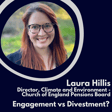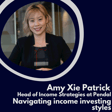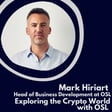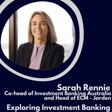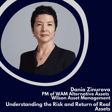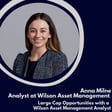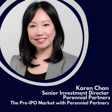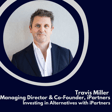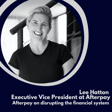Introduction to Alpha Females Invest
00:00:03
Speaker
Welcome back to the Alpha Females Invest podcast. Two females working in the finance industry searching for alpha. My name's Emily. And my name is Clooney. And together we bring diversified perspectives from the buy and sell side of the finance world.
Disclaimer: Educational Content Only
00:00:17
Speaker
As usual, any information discussed in this podcast is not financial advice.
00:00:22
Speaker
All opinions reflect those of the individuals and this podcast is for educational purposes only. You should always read the PDS and talk to a financial advisor who can consider your personal circumstances before you invest.
Meet April Lois and Minnie Tong
00:00:35
Speaker
Today we have a very special episode because we have not one, but two guests on our show M. We're joined by April Lois and Minnie Tong from Baron Joey Capital, which is a new Australian investment bank which recently launched last year backed by both Magellan and Barclays.
00:00:53
Speaker
April is an equity research analyst with Baron Joey's in the emerging companies team. Prior to that, she worked in equity research at Credit Suisse, covering ESG, and prior to that, in wealth management in Credit Suisse's private bank and at Fortitude Private Wealth. Minnie is an analyst in the telco and
Inside a New Investment Bank
00:01:11
Speaker
media sectors with Baron Joey, and prior to that, she worked in equities research at UBS across a few sectors and a four-year cadetship.
00:01:19
Speaker
Today, we will be covering what life as an analyst is like at Baron Joey's, why they decided to join a new investment bank and the key valuation and earnings drivers in their respective sectors. Welcome to the show, April and Minnie. Thanks for having us. Thanks for having us.
00:01:35
Speaker
Now, as Em and I are very well versed in, we always like to start each episode by asking the same
Workplace Pranks and Embarrassing Moments
00:01:42
Speaker
question. So maybe Minnie, I'll hand it over to you first. Could you tell us what's your most embarrassing career moment? Yes. Well, I should start by mentioning I'm a twin in case you ever come across her and think it's just me ignoring you. As you can imagine, it happens quite often. But my twin sister and I both used to work together at our previous employer when we first got into finance, but in different departments.
00:02:05
Speaker
And on April Fool's Day, we decided to swap desks to try and trick my manager at the time to see if he could tell us the part. And a few people in the office were in on it, and I hid nearby with some others listening in. And they'd had an extended conversation, but then he started talking about things she didn't know about. And he just thought it was really strange that I'd seemingly hit my head and suddenly forgotten everything.
00:02:30
Speaker
and just still hadn't realised after a while, wasn't getting it. So eventually I popped out and said April Fools. But yeah, it was embarrassing that my own manager who I'd work with every day couldn't recognise me. I think that's a good one. A good April Fools joke. That is a good one. And speaking of April Fools, maybe we'll pass to you April. Is that insulting? Am I the fool here?
00:02:55
Speaker
My most embarrassing career moment is pretty cringy. It's a classic public speaking incident. I was asked to speak an event on ESG not long after I started my first role in research. So the moderator turned to me and asked the first question. I just apparently stared blankly back at him and couldn't find my words.
00:03:16
Speaker
So, my colleague kindly stepped in to answer the question for me. I luckily recovered and was able to answer the rest of the questions once I overcame my nerves, but it was certainly not a career highlight, that's for sure. I've since tried to develop those skills. I think understanding your content is the most important factor because it gives you confidence. So, that's my hot tip for everyone today. Thanks, Abel. You're jumping into the top career tip a bit early.
00:03:42
Speaker
There you go. Mine's done. We can cross that off.
Joining Baron Joey: Motivation and Culture
00:03:46
Speaker
Eiffel and Minnie, you're obviously both from other investment banks before joining Bar and Joey. So, I guess we were interested to understand what your decision was behind moving firms and specifically to Bar and Joey. And maybe we can start with Minnie.
00:04:00
Speaker
Personally, for me, it was twofold. Firstly, it's not every day that you get to help build a full service financial services firm from the ground up that's very well equipped to compete against the majors and watch our journey progress as we establish ourselves. It is daunting, but equally super exciting, celebrating every milestone from our first IPO, first trade, first research note, which
00:04:23
Speaker
actually April worked on and another thing is we've hired from a diverse range of 85 employers across the firm and specifically 15 for research and it's been really good to see as part of this bill process everyone brings suggestions from the old firms that worked really well to collectively build something even better and the second thing for me was quite a few people I knew had moved over who I've really enjoyed working with before and I knew I was coming into a really solid team.
00:04:51
Speaker
Great. And April? The only thing I would add is just wanting to be part of a leading research franchise. So while I was the first research hire, I didn't know exactly who I'd be working with. I knew that the aim was to hire really great analysts. And we've certainly seen that come to fruition with 34 great people now in research. So for me, I get to continue to learn and be trained from really highly regarded analysts, which will hopefully in turn make me a better analyst. Definitely.
00:05:21
Speaker
Now, obviously, Baron Joey is pretty well capitalized. I mean, they do have some good backing from some very well-known financial services firms. But I guess it is considered by some to still be a startup. And I guess both of you mentioned building something from the ground up. So, I guess, did that impact your decision at all? April, maybe we'll just go straight to you again.
00:05:44
Speaker
Yeah, I think from my perspective that it really brings the best of both worlds because you have that startup culture of innovation and entrepreneurship with a blank page and ability to build something original. But yes, it is well capitalized and we're in a really fortunate position compared to many other startups where we can create a business at scale because that is actually really important in this industry. Couldn't agree more with April.
00:06:10
Speaker
Absolutely. I think that's a really good answer.
A Day in the Life of an Analyst
00:06:13
Speaker
Maybe can we just take it back to the very basics and maybe for Minnie, I'm going to turn to you, but can you talk us through your typical day as an analyst? What do you get up to? And for those that don't know, I guess, how do you spend your hardcore research hours?
00:06:29
Speaker
So generally we start between 7 to 7.30 and check news flow for what happened overnight or in the US because as analysts you're meant to keep abreast of all things relevant to your coverage and filter through and interpret this information. At 7.40 we then have a meeting with the sales desk to run through key research published in the last day or revisit some topical names for a refresh on the thesis.
00:06:52
Speaker
We've got a great dialogue with our sales team, who we work with closely. Then after that, it really varies between firstly, research analysts are constantly analyzing news, financial statements, economic events, company announcements, which influence a company's performance and growth. And these then inform the inputs to our financial models, which we regularly update, views on a company and recommendation.
00:07:17
Speaker
And so we publish these findings in reports and write on basically anything material to a stock, whether it be a deep dive into a business they bought an interest in, new products, any M&A, or importantly, financial results. So reporting season is a very busy time for us. And at the moment, everyone at Baron Joey is working on initiations. So that's a detailed report we do when we begin coverage of a stock.
00:07:43
Speaker
We do a lot of meetings and calls with clients to communicate these views and answer any questions they may have or you might do this meeting over lunch but for the most part lunch is at your desk and we conduct industry diligence and primary research through expert conference calls, surveys, meet with the management of companies and other channel checks. So essentially it's all about being across all the information relevant to your covered companies and
00:08:10
Speaker
doing rigorous due diligence behind your investment ideas such that you're able to help clients make informed investment decisions.
00:08:17
Speaker
That's a really good run through. And obviously you work as part of a team within Meteor and Telco sectors. So can you talk through what the typical structure of a sector team is? Typically the teams are run quite lean where you'll have one lead analyst and usually one associate. Together you could cover anywhere between 10 and 20 stocks. Some teams are bigger. It's not uncommon to have three in a team depending on the capacity and coverage. Small caps is also different given the wider coverage. So we have six analysts in that team.
00:08:48
Speaker
And Minnie, just on that, what is the difference between your role and a lead analyst? Is there a large difference or do you work really closely together?
00:08:56
Speaker
The primary duty of an associate is to assist lead analysts, and it's generally a pretty flat organizational structure where associates work very closely with leads to perform a lot of the tasks I mentioned earlier, but I guess to a lesser degree, as associates are still very much involved in conducting research, building models, gathering information for reports, but ultimately the lead analyst makes the final calls on stocks and has built a lot of industry connections and relationships.
00:09:25
Speaker
But even amongst associates, there are varying levels of industry experience and many are covering stocks and subsectors in their own right. And you learn a lot under the direction of a lead analyst and actually many lead analysts begin in associate positions and they work their way up.
Sector Challenges and Opportunities
00:09:41
Speaker
Yeah, great. And then I guess going specifically into your sector that you cover, I guess can you talk us through the key issues in the media and telco sector? And I guess what are the key debates that you're writing about and discussing with clients?
00:09:55
Speaker
Yes, so starting off with telcos, obviously a key issue is how they've responded to challenges presented by the NBN, because higher NBN wholesale costs have resulted in retailer margins falling significantly. So it's been interesting to see how the telcos compensate for these lost earnings elsewhere. And that's why we're hearing lots about fixed wireless alternatives and 5G, which have better economics.
00:10:18
Speaker
Related to that, a key focus for us is return on invested capital. So given the migration to MBN and a period of intense mobile competition, ROICS have declined to around 3% from over 13% five years ago. But with improving mobile rationality, ARPU benefits from 5G, maybe CPI linked to price rises, and changes to their pricing structure, hopefully we're at the start of seeing ROICS inflect, which should see the whole industry benefit.
00:10:45
Speaker
And of course, infrastructure assets are a hot topic. Both Telstra and Optus recently monetized their tower assets, selling stakes for pleasing multiples and TPG looks to be next. And if I split media into online and traditional, in online for the likes of your car sales, seek and REA, as their traditional print to online migration tailwinds have started to slow, the market is increasingly focusing on what new growth levers they have to justify their growth premiums.
00:11:13
Speaker
So, it's been an exciting space to research and recently we wrote deep dives into the new transaction models and international growth options. And lastly, in traditional media, just quickly, the challenge has been turning around what were previously terminally declining segments like TV and print back to growth.
00:11:33
Speaker
which we think companies like 9 Entertainment have done a good job of, and now it's about convincing the market to value these businesses at premium multiples versus history to factor things like digital subscriptions and Bevod and new Google and Facebook deals.
00:11:48
Speaker
Minnie, you just touched on it then. You spoke about trying to convince the market to revalue these companies in a different way than we have in history or perhaps in the past. How does your investment decision or the conclusion you come to really influence the market and what factors or what levers can you pull to ensure that your clients are listening to your investment decisions?
00:12:10
Speaker
Well, the role of equity research I think is to provide information to the market and help make markets more efficient. And what I mean by that is a lack of information creates inefficiencies that results in stocks being mispriced, whether over or undervalued.
00:12:25
Speaker
I think the value from research comes from filling in these information gaps accurately and timely so that investors can make fully informed investment decisions because our clients usually look at multiple sectors and don't have time to be across every last nuance of each company just because of the sheer volume and complexity of information affecting a company.
00:12:45
Speaker
Whereas, because research analysts specialize in a sector to develop that high level of expertise, our investment recommendations can therefore lead to changes in the trading price and volume of a stock. So, in particular, analysts who have that ability to service clients well and provide insightful ideas can positively influence others' investment choices.
Career Pathways in Equity Research
00:13:08
Speaker
Yeah, great. And I mean, your role obviously sounds quite exciting and dynamic and pretty varied in the skill set. I guess what advice can you give to someone who might be listening who's interested in getting into equity research?
00:13:21
Speaker
Now is a great time to get into research. There's been quite a bit of musical chairs, which admittedly is partly because of Varanjali, but really there are a lot of opportunities open across the market. So I'd say reach out to anyone already in the industry and network. Finance is a small world and there's a high chance someone can refer you to the right person or send someone in research a message on LinkedIn. Practice pitching about stocks you like and why and refine it, because ultimately that's what you do on the job.
00:13:50
Speaker
And remember what's most important isn't necessarily your conclusion but your explanation. And the other thing I'd say is while a bachelor's degree in finance or accounting is preferred, I've seen plenty of people move over from other backgrounds who obtained additional finance qualifications like a diploma or CFA.
00:14:12
Speaker
For example, our healthcare analyst now actually used to be a doctor. And I think what's more important is building the right skill set. So be curious and engaged about understanding minute details about a company, hone your modelling data analysis and writing skills. So yeah, if you're passionate about finance, detail oriented and dynamic markets excite you, then go for it.
00:14:36
Speaker
I feel like you've given us a couple of top career tips there as well. So maybe we'll just skip that question altogether. That's a great overview. Thanks,
Understanding Small Cap Stocks
00:14:44
Speaker
Minnie. Now, turning to you, April, we're going to turn the hot seat over. You obviously work in the emerging companies team, which can also be defined, I guess, as the small caps team. I think it's a really interesting space with such a variety of different companies. So can you tell us, how does yourself and your team categorize a small cap stock?
00:15:04
Speaker
We generally categorise them as companies within the ASX 300, excluding the ASX 100, so they can be a range of sizes, but generally within those bounds of the 100 to 300. And as investment managers, you know, why would they want exposure to small cap stocks? What's the key benefit in your opinion?
00:15:24
Speaker
M might be able to provide some more context than me coming from an investment manager, but from my perspective, it's primarily for the higher growth potential and to get exposure to companies and sectors with structural growth stories. Yeah, that makes complete sense. And then I guess if someone's looking at a small cap, how does the valuation process differ from something in mini sector or other large cap stocks?
00:15:47
Speaker
Yeah, so there are some differences and similarities. So DCF, which is discounted cash flow, is still primarily our core valuation method, which is similar to a lot of large cap analysts, depending on the sector. But for some of the high growth companies, we also look at comparable company valuation. So this is where you look at metrics for similar companies, for example, EV to EBITDA or EV to sales.
00:16:12
Speaker
And we also consider factors underpinning long-term growth. So we might undertake a TAM, which is total addressable market sizing analysis. And we also look at the strength of a company's market position. So there's definitely a few different factors we consider when looking at evaluation.
00:16:29
Speaker
That's really interesting and I think there's a lot of different factors to consider given all these companies sit in multiple sectors as Em just mentioned. I'm interested in how do you actually choose which companies you ultimately cover in this space? Do you have to go through a bit of a process before that or do you pick the eyes out of such a big basket?
00:16:48
Speaker
It's a really good question. So we actually have quite a lot of flexibility in terms of what we cover. And at Barangiou we're very lucky to be starting with a clean slate so we can choose companies that our clients are interested in. So this is often those fast growing companies that might not be well covered in the market yet where we think that we can provide value add for our clients.
00:17:11
Speaker
Yeah, great. And then obviously, again, as a small cap analyst, you know, the sector's pretty broad in small caps, the types of companies that are in the index. So, you know, you're typically covering or looking at companies across multiple sectors, versus a large cap analyst, which might just cover one sector, there might be specialists in banks or utilities. So how do you manage to understand all of the different elements across all the different sectors that you're looking at?
00:17:38
Speaker
It's definitely lifelong learning. From my perspective, it's been really good working with great analysts, but particularly starting from the beginning by doing the initiations, which Minnie touched on. So they're those first big detailed reports where we build a model around it. We also have a reasonably big emerging companies team at Baron Joey. So we still have somewhat sector experts. So for example, Nick is an expert on the platform. So Harvard Netwealth,
00:18:06
Speaker
Josh is an expert in tech and Ari is an expert in retail. While we might be spread more than a typical large cap sector, each analyst still has their area of expertise. April, what are the key features of a successful small cap company that you look for? When you're looking at a company, what makes you go, this is great or this is not so great?
00:18:28
Speaker
We analyze companies using a qualitative and quantitative framework. So some of the key areas we look at and features of successful small caps that your listeners might want to consider in their own investments include branding, where you look at net promoter scores to assess customer satisfaction and brand reputation. Another one we'd look at would be management alignment and culture, which are important ESG factors, where we would consider management incentives and employee satisfaction.
00:18:58
Speaker
And then on the quantitative side, important features to look at are churn to see if a company is actually retaining its customers or whether they're using the product once and moving on, which might not be a good reflection of the product itself. And of course, we look at the company's revenue model. So is it repeatable and recurring? Is it steady or lumpy? And so on.
00:19:17
Speaker
Yeah, great. That's some really good indicators. And leading on to that, combining all of your knowledge so far, can you give us your favourite small cap company and maybe talk us through why you have a positive rating?
Case Study: Event Hospitality
00:19:29
Speaker
Sure. So one company that's quite interesting at the moment is Event Hospitality, EVT. So Event owns and runs Event cinemas. It has a hotel segment, which includes Ridges, QT, Echure, and Juicy. And they also run Fred Bow's Ski Village. So we like Event for two main reasons. The first is, of course, the cinema recovery. So there is a backlog of almost two years of blockbuster films that are just starting to be released.
00:19:54
Speaker
The new Bond film, for example, was released in November and the first weekend it did $11 million at the box office in Australia, which was the best opening since Boxing Day 2019. This highlights plenty of pent-up demand and these blockbuster films, which are really important for event, not only to generate ticket sales, but also the food and beverage, which they have really high margins on. I'll actually be seeing June this weekend and I know I personally can't walk past those $10 pods.
00:20:23
Speaker
And the second reason is the property asset recycling. So Avant is in a unique position where it's exposed to the recovery, but it also has asset backing. It owns most of its hotel and cinema properties along with some other non-core assets. And in February this year, it actually flagged that it would sell $250 million worth of non-core assets and reinvest them in higher return on investment Sydney CBD developments, giving the company a mid to long term growth story.
00:20:52
Speaker
That's a great investment thesis, April, and thanks for sharing that with us. You touched on the point of pent-up demand, and I think that is rife in the economy at the moment in a lot of different sectors. I definitely agree with that one. Thank you both for coming on the show today. It's been really exciting for M&I to get a bit of an understanding and do a bit of a deep dive into the average life of an analyst. Next week, we've got two other analysts from Baranjoy also joining the show who work in different sectors, so I'm keen to get their views
Career Advice and Closing Remarks
00:21:20
Speaker
But before we do wrap it up, and I know you both alluded to some great career tips before, but we might ask you again, Minnie, maybe turning to you, can you tell us what's your top career tip? So something someone else told me, which I'm going to steal here because I don't consider myself a source of authoritative advice.
00:21:38
Speaker
And this is more a micro, hopefully useful tip for juniors or any subordinate physician is when you're with your manager in meetings or whatever situation and someone asks them a question, try to answer it yourself in your own head to kind of put yourself in their shoes and prepare for being in that position and compare and learn from what you might have missed from their response because you learn better from practicing and doing versus passively absorbing and listening.
00:22:05
Speaker
Hopefully as part of that you have a good manager and team to learn from.
00:22:09
Speaker
I thought you were about to say there that when you answer in your head, you were going to say, and then just answer it for your boss. And I was like, oh gosh, I don't know if that's the best career advice I've ever had. But thanks for sharing. That's a really good one. And I'm definitely going to implement that for myself. And April, what about you? I know that a previous guest has said something similar, but I really have to emphasize to put your hand up for everything, even if on paper you feel like you maybe don't have all the qualifications or tick all the boxes.
00:22:38
Speaker
A lot of companies now consider other factors when hiring or considering a promotion. So you might still be the best candidate even if it doesn't feel that way when you're applying. So that's my hot tip. One of a few today. Well, I'm sure Em and I love to put our hands up for absolutely everything as evidenced by our little podcast today. So thank you so much both for coming on. As I mentioned, we're super keen to continue the Baron Joey Part 2 series next week. But thank you, girls. We've had a great chat today.
00:23:06
Speaker
It's been a pleasure. Thanks so much for your time. It was great. Thank you for listening to the Alpha Females Invest podcast. If you liked this episode, we would love your support on Instagram. You can find us at Alpha Females Invest. You could also leave a podcast review, but most importantly, please keep listening. See you next time.




